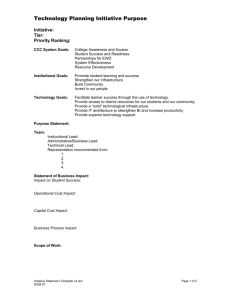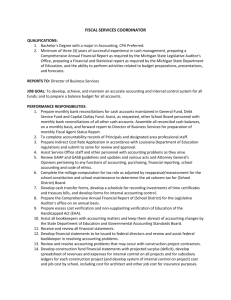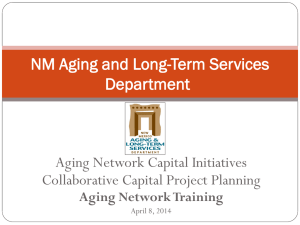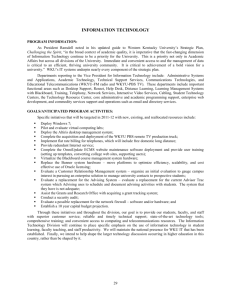Introduction to Capital Outlay - New Mexico State Agency on Aging
advertisement
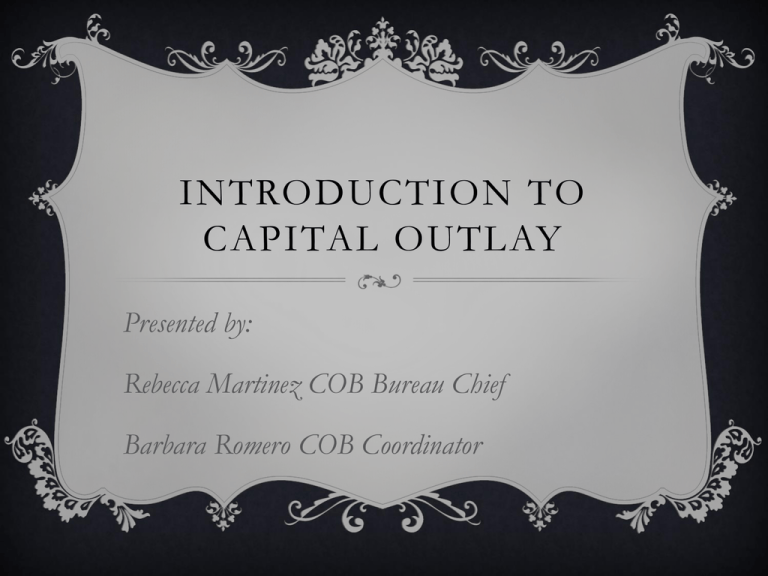
INTRODUCTION TO CAPITAL OUTLAY Presented by: Rebecca Martinez COB Bureau Chief Barbara Romero COB Coordinator WHAT IS CAPITAL OUTLAY? Capital Outlay is funding intended for the acquisition, improvement, alteration or reconstruction of assets for long term use, including land, buildings, equipment, furnishings, and vehicles, code compliance, ADA compliance improvements. Capital Outlay funds cannot be used for operating expenses, salaries, supplies, events, brochures, retroactive reimbursements of previous payments, loan payments or for a private non governmental entity. W H E R E D O C A P I TA L F U N D S C O M E F RO M ? The funds are derived from bonds which are essentially loans the state acquires with various revenues pledged by the state to make the loan payments. Payments made in cash or cash equivalents over a period of 7 to 10 years used to acquire assets or improve the useful life of existing assets. The expenditure is recognized on a balance sheet gradually over the course of an asset's useful life. *Capital Outlay grants smaller than $5000 are not economically feasible when you consider paperwork, personnel time and loan requirements factored into the cost. WHAT ARE OUR SOURCES? Severance Tax Bonds Funds are derived from royalties paid by companies that severe a natural resource from the earth such as oil, gas. timber, mineral products like copper, gypsum, pumice Use of the funds are subject to the State Board of Finance Bond Project Disbursement Rule NMSA 2.61.6.1 General Obligation Bonds Is a municipal bond in which the issuing locality pledges to use all revenues at its disposal to pay bondholders, including the raising of property taxes. Use of the funds are subject to the State Board of Finance Bond Project Disbursement Rule NMSA 2.61.6.1 SOURCES CONTINUED……………………… STB's are used to finance statewide Capital projects and usual issued in Spring following the Legislative Session to fund projects that have been authorized by the legislature and approved by the Governor. GOB are a primary source of funds for capital outlay projects statewide. In even numbered years, the New Mexico Legislature authorizes GOB to be voted on in public referendum at the subsequent November Election. GOB that are approved by a majority vote are issued by the NM State Board of Finance. CRITICAL NEED Defined as, “critical activities which address an urgent need or emergency situation that immediately endangers occupants of the premises or creates a serious threat to the health and / or safety of citizens.” Situations in which immediate action is necessary; The situation would disrupt a senior center from operating or failure is imminent if not corrected in a timely manner; The threat can be supported by a subject matter expert; The situation was not a direct cause of poor maintenance or neglect and steps were taken to prevent, alleviate and or correct the situation; and The resources required to correct the situation were unavailable. USEFUL LIFE? Useful life is defined as, “The expected period of time during which a depreciating asset will be productive.” The state has determined that the useful life is estimated between 7 to 10 years. CAPITAL OUTLAY REFORM Executive Order 2013-006 – effective May 2, 2013 • • • • • • Compliance with the audit act Grantee has sound fiscal practices Ensure no unconstitutional outcomes Protect Public funds Meet bond obligation requirements Uniform grant management practices New Mexico State Auditor Rule 2.2.2 NMAC EXECUTIVE ORDER 2013-006 Executive Order 2013-006 On May 2, 2013, Governor Susana Martinez signed the EO requiring recipients of State capital outlay appropriations to have adequate accounting methods and procedures in place to safeguard capital outlay funds and assets acquired with the funding. This should provide for better oversight and management of the State capital outlay appropriations. R E V I E W O F C U R R E N T AU D I T ( O R AU P AG R E E D U P O N P RO C E D U R E S ) Acceptable Unacceptable Unqualified – concludes Qualified - When the auditor, having obtained Unmodified – concludes Disclaimer – The auditor disclaims an opinion that the financial statements of a given entity are presented fairly, in all material respects, in accordance with GAAP that the financial statements of a given entity are presented fairly, in all material respects, in accordance with GAAP enough good audit evidence, or is unable to obtain enough good audit evidence upon which to base an opinion, and concludes that misstatements are material to the financial statement or possible effect on the financial statements of undetected misstatements if any could be material but are confined to specific elements, accounts, or items on the financial statement when he or she is unable to obtain enough good audit evidence to base an opinion on, and concludes that the possible effects of undetected misstatements on the financial statements could be both material and pervasive Adverse - Expressed when, after having obtained enough good audit evidence, the auditor concludes that misstatements, individually or when grouped with other misstatements, are both material and affect multiple elements, accounts, or items of the financial statements. SOUND FISCAL PRACTICES means the aggregate set of practices and procedures which allow for the accurate, transparent, and effective handling of all government monies and government contracts. • A coherent set of accounting procedures and standards which reveal that public monies were spent in accordance with due authority, that all transactions were recorded accurately, and that a complete audit trail exists to facilitate a post expenditure review • Transparent budget mechanisms for the allocation of monies to various expenditure • A decision making and approval system which limits the span of influence exercised by any individual official over a particular spending program • A set of performance indicators associated with all expenditures, so the effectiveness in meeting declared targets can be measured. UNCONSTITUTIONAL OUTCOMES “A N T I - D O N AT I O N C L AU S E ” Article IX, Section 14’s general prohibition: “Neither the state nor any county, school district or municipality, except as otherwise provided in this constitution, shall directly or indirectly lend or pledge its credit or make any donation to or in aid of any person, association or public or private corporation or in aid of any private enterprise Section 6-5-6(C) NMSA 1978 requires all state agency expenditures to be: for a public benefit and purpose consistent with the related appropriation; and necessary to carry out the statutory mission of the state agency. PROTECT PUBLIC FUNDS State has spent over 8 billion on capital outlay. Some projects were only partially funded and left unusable Some projects never were completed and the funds reverted Some funds have been mismanaged and not used for the intended purpose States bond rating has been affected O B L I G AT I O N B O N D R E Q U I R E M E N T S General Obligation – 5% expended within 6 months of the bond sale 85% expended within 18 months of bond sale Severance Tax Bond - 5% expended within 6 months of bond sale 85% expended with 3 years of bond sale U N I F O R M G R A N T M A N AG E M E N T Ensure grants have provisions to terminate the grant No provisions to prevent grantees from entering into third party obligations No provisions to submit expenditures within quarter Now the grants provide for more language to better track and control binding written agreements, better expenditure requirements, termination clause CHANGES TO APPLICATION Only projects that are critical in nature will be considered Plan and design projects must be submitted during the STB cycle Justification for the critical need must be well documented through a project assessment process and supporting documentation Use of the new Senior Facility ICIP database is required Past performance of grants management will be evaluated 2 0 1 6 P RO P O S E D C A P I TA L O U T L AY R E QU E S T Priority Project Type Amount Request Project Rank 1 Code Compliance/Renovation $ 1,684,150 >65 2 Vehicles $ 3,421,400 >65 3 Meals Equipment/Other Equipment $ 911,550 >65 4 Other Renovation $ 1,504,700 >65 5 New Construction / Major Addition $ 16,123,700 >65 Totals $ 23,699,500 2016 LEGISLATIVE SESSION Session Dates January 19 Opening day (noon) February 3 Deadline for introduction February 18 Session ends (noon) March 9 Legislation not acted upon by governor is pocket vetoed May 18 Effective date of legislation not a general appropriation bill or a bill carrying an emergency clause or other specified date QUESTIONS?????? Contact info: Rebecca Martinez, Capital Outlay Bureau Chief 505-476-4768 Barbara J, Romero, Capital Outlay Coordinator 505-476-4704 Mary Chavez, Capital Outlay Administrative Asst. 505-476-4879
